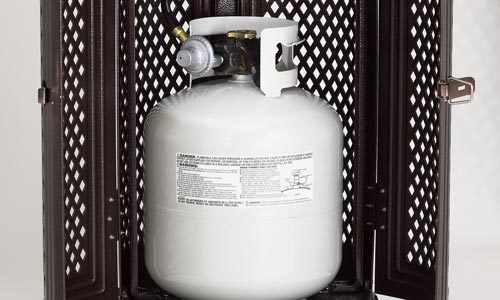Know the Pros and Cons of Using Liquid Propane for Heaters and Grills
Understanding the Advantages and Disadvantages of Using Liquid Propane for Heaters and Grills
5 minute read | FAQs

Whether you're a homeowner or business owner, choosing between liquid propane, natural gas, or other energy sources for your heaters and grills can feel overwhelming. Cost, convenience, and environmental impact all play crucial roles in the decision-making process.
When evaluating the pros and cons of propane fuel, it's essential to first understand what liquid propane is and how it differs from other fuel sources. While this might sound daunting, making an informed choice doesn't have to be overly complicated.
What Exactly Is Liquid Propane?
Liquid propane, often referred to as "LP," is typically extracted during the petroleum refining process. It can come from natural gas streams pulled from the ground or during the refining of fossil fuels. LP gas is widely used to heat homes, power commercial facilities, fuel grills, heaters, stoves, and more. It remains one of the most accessible portable fuel sources both domestically and internationally.
Is Propane a Clean-Burning Fuel?
The short answer is yes. Liquid propane is a clean-burning fuel that does not emit harmful pollutants into the environment. It surpasses many other fossil fuels as an eco-friendly option since it poses no threat to water, soil, or air quality.
Given its safety profile, the Environmental Protection Agency (EPA) supports the widespread use of large, underground storage tanks. All evidence indicates that LP gas usage offers significant environmental advantages over similar fossil fuels.
Benefits of Using LP Gas in Standing Propane Patio Heaters
Clearly, LP gas provides the environmental protection that homeowners and businesses value. However, there are still practical pros and cons to consider regarding propane fuel usage. One of the most common applications involves relying on at least one standing propane patio heater to extend the outdoor season or provide late-night comfort. Brands like Sunglo and Patio Comfort from AEI stand out as some of the most dependable and innovative products available today.
Among the top benefits of these iconic mushroom-head, gas heaters is their flexibility. Unlike heaters dependent on fixed fuel lines, the Sunglo and Patio Comfort models can be safely relocated when cooled by following the manufacturer's guidelines. They remain relatively lightweight, with the propane discreetly stored inside the unit's base. This makes them easy to move when necessary, offering unmatched mobility.
Another advantage of using LP gas in standalone outdoor heaters is the reduction in exposed flames. Not long ago, people gathered near outdoor heaters due to the necessity of staying close to the visible flame. The introduction of infrared portable propane heaters, such as those from Sunglo and Patio Comfort, has transformed the experience. These modern designs maintain their agility while using infrared technology to warm objects and individuals within a broad coverage area. Comfort no longer depends on clustering around the heater; instead, an infrared portable propane heater ensures warmth across a larger space. This far surpasses other types of heaters. But do the same benefits apply to gas grills, or is this comparison comparing apples to oranges?
Pros and Cons of Stainless Steel Propane Grills
It's evident that LP gas is overwhelmingly the preferred fuel source for stainless steel propane grills in both residential and commercial settings. Without delving too deeply into the reasoning behind this preference, agility, convenience, and portability clearly outweigh the limitations of fixed natural gas lines.
The tanks are cleverly concealed inside patio propane grills, and refilling options are conveniently available at gas stations, convenience stores, and supermarkets, among other places. These units are straightforward to operate, often equipped with matchless ignition systems and advanced briquettes that minimize flare-ups and ensure even cooking. Additionally, propane generally burns twice as efficiently as natural gas. Thus, a high-quality stainless steel propane grill remains an invaluable asset for outdoor cooking enthusiasts.
However, how does propane compare to charcoal grills? Let's explore further.
Propane vs. Charcoal Grills
Arguably, one of the main reasons some people stick with charcoal grills is cost. While charcoal grills may be less expensive upfront, they come with several drawbacks. For instance, charcoal grills require harsh chemical starters that release black smoke and harmful carbon emissions into the environment. They tend to be greasy, messy, and prone to flare-ups that result in unevenly cooked meals. These basic cooking tools lack the advanced features and accessories found in premium stainless steel propane grills.
Consider, for example, the PGS propane grills currently trending on the market. These units can be enhanced with optional accessories like rotisserie kits, infrared cooking options, side shelves, additional burners, steam trays, and smokers, as well as automatic shut-off timers. These features highlight why propane gas grills outshine outdated charcoal models. Comparing the two isn't apples-to-oranges since charcoal isn't even in the same category as propane.
Have more questions? We’re here to help! Get in touch with us today for further assistance.
walker wheel,wheel for walker replacement, walker light up wheel
Zilon , https://www.gdzilon.com
